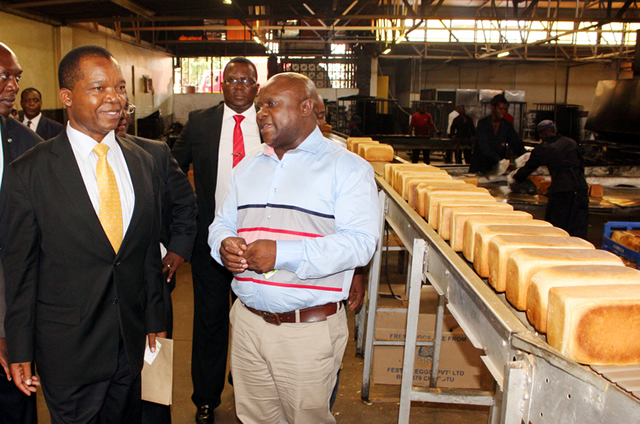Bread shortages hit Zimbabwe
By Tendai Kamhungira
Bread supplies have declined drastically — giving rise to shortages — as bakers grapple with bottlenecks in the availability of flour.

A survey by the Daily News yesterday showed that some retail outlets were running out of bread, as volumes have significantly dwindled.
This follows recent warnings by the Grain Millers Association of Zimbabwe (GMAZ) that the country faced imminent shortages if millers did not get an urgent allocation of foreign currency to import wheat held up in neighbouring Mozambique.
The Confederation of Zimbabwe Retailers (CZR) confirmed yesterday that there were limited supplies of bread in the country.
CZR president Denford Mutashu revealed yesterday that retailers met with representatives from the National Bakers Association of Zimbabwe (NBAZ) recently to discuss the crisis.
“The supply of bread is limited at the moment especially from external suppliers and by external suppliers we mean big bakeries. We, however, expect the situation to improve in the next week or so because we have been promised (that) there is wheat which is on its way to Zimbabwe,” he said.
The confederation estimates that the demand for bread has gone up by as much as 30 percent in the last few months.
“More Zimbabweans are consuming bread. Taking that into consideration would require that we support bakeries through the supply of the raw materials needed in bread production.
“They (the bakers) raised the issue when we had a meeting with (NBAZ president Ngoni) Mazango, who said these are some of the problems faced by the bakery industry,” Mutashu said.
According to a September 4, 2018 letter from GMAZ general manager Lynette Veremu to the organisation’s chairperson, Tafadzwa Musarara, the wheat supply situation has reached a critical stage and needed immediate attention.
GMAZ said millers were sitting on less than 28 000 metric tonnes (MT) of wheat against a required minimum national month stock level of 114 000MT.
The current monthly national requirement is 38 000MT.
At the time, the Reserve Bank of Zimbabwe (RBZ) was yet to remit $12,5 million to the wheat supplier, Holbud Limited (United Kingdom) from GMAZ’s Ecobank wheat account, which was adequately funded.
Due to failure to remit the money, Holbud had been growing impatient and threatening to divert stocks currently at Beira to Mozambique and Malawi millers.
“With respect, wheat and fuel are both in category one of the Reserve Bank of Zimbabwe foreign payment remittance priority list. Regrettably, fuel gets $21 000 000 per week religiously but wheat is not getting a paltry $12 450 000 per month for the entire monthly requirements.
“Self-raising flour has disappeared in many shops nationwide. Small bread bakers are stocked out. I strongly recommend that you alert the powers-that-be of this predicament as the country is fast plunging into severe flour and bread stock-outs in the next few days,” the letter reads.
Efforts to get a comment from Musarara could not yield results yesterday.
GMAZ spokesperson Garikai Chaunza told the Daily News that Musarara was out of the country to attend to the crisis.
The Daily News was also not able to get a comment from Mazango, who said he was in a meeting yesterday.
Musarara had written to Holbud on August 17, 2018 pleading for the release of 30 000MT of wheat held up in Mozambique, claiming he had been tasked by the central bank to negotiate with the company for a settlement, in which payments would be made within 60 days.
The letter was copied to Vice President Constantino Chiwenga, Agriculture minister Perrance Shiri, and RBZ governor John Mangudya among others.
Holbud responded two days later, turning down the proposal.
“We regret to inform that our bankers will not accept the RBZ guarantee for payments for the following reasons…RBZ/GMB has an outstanding payment to us, $12 242 025, 48 for maize supplied in 2016, the payment for which was promised in June 2017 but yet to receive.
We had been promised several times but till date, payment has not been received, making our position with our bankers very bad even though we were the only company to fulfil the commitment by bringing around 300 000MT during the drought period and avoiding a shortage of maize in the country,” Holbud said.
The company further said it was owed $10 707 597, 70 by RBZ/GMB for fertiliser delivered.
“We have been supporting by timely delivery of the cargo but the promises for payments are never fulfilled as you will see from above, though we were given to understand other importers are being paid for fertiliser.
As mentioned to you in our offer, we can’t keep the wheat in Beira for long, as you are aware the international situation of wheat is very tight due to drought in most wheat growing areas in the world and prices are very firm,” the company said, adding that the failure to pay for the wheat was going to result in it offering the cargo to Mozambique and Malawi.
According to officials, Zimbabwe needs an estimated 400 000MT of wheat per year to meet its demand of about 950 000 loaves of bread per day. Daily News.






